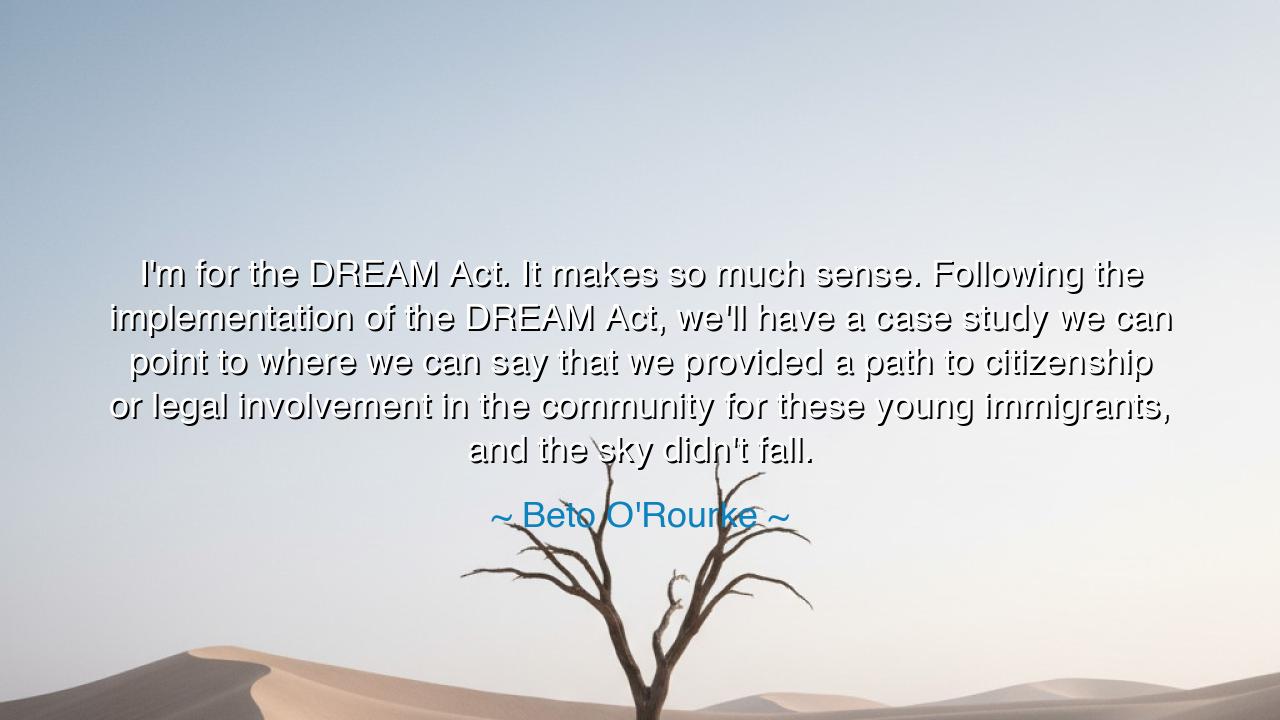
I'm for the DREAM Act. It makes so much sense. Following the
I'm for the DREAM Act. It makes so much sense. Following the implementation of the DREAM Act, we'll have a case study we can point to where we can say that we provided a path to citizenship or legal involvement in the community for these young immigrants, and the sky didn't fall.






When Beto O’Rourke proclaimed, “I’m for the DREAM Act. It makes so much sense. Following the implementation of the DREAM Act, we’ll have a case study we can point to where we can say that we provided a path to citizenship or legal involvement in the community for these young immigrants, and the sky didn’t fall,” he spoke with the calm conviction of a man appealing to reason in an age of fear. In these words lies both idealism and realism, the marriage of moral duty and practical foresight. O’Rourke was not merely defending a policy; he was defending a principle as old as civilization itself — that those who dwell among us, who work, study, and dream beside us, are part of us. He sought to remind his nation that compassion need not come at the expense of order, and that inclusion, far from breaking society, is what strengthens it.
The DREAM Act, whose name stands for “Development, Relief, and Education for Alien Minors,” was born from the struggles of young immigrants — often called “Dreamers” — who were brought to the United States as children. They grew up pledging allegiance to the same flag, studying in the same schools, and dreaming the same dreams as their peers, yet lived under the shadow of legal uncertainty. O’Rourke’s defense of the Act emerged in a time when immigration was a battlefield of politics and emotion. In his words, he offered not outrage, but clarity: that creating a path to citizenship for those who had done no wrong was not a threat to the nation’s integrity, but a fulfillment of its promise.
His statement also carries a quiet challenge to the chorus of fear that so often surrounds reform. When he says, “the sky didn’t fall,” O’Rourke invokes the voice of reason against hysteria — a reminder that throughout history, societies have often resisted progress out of imagined doom. He places faith not in the walls of division, but in the resilience of the human spirit. For he believes, as the ancients did, that justice guided by wisdom cannot destroy a nation; it can only refine it. The DREAM Act, to him, is not merely law — it is the living embodiment of mercy joined with accountability, the recognition that young hearts should not bear the sins of circumstance.
History is filled with moments when nations faced the same choice: to fear the outsider or to embrace their potential. When the Roman Republic granted citizenship to conquered peoples, many senators warned that Rome would crumble beneath the weight of inclusion. Yet instead, Rome grew stronger, its identity expanding, its armies more loyal, its spirit more united. Likewise, when America opened its arms to refugees after World War II, there were fears of economic ruin — yet those who came built businesses, led innovations, and enriched the very soil that had welcomed them. O’Rourke’s words echo this ancient rhythm: that human dignity is not a liability but the foundation of strength.
The “case study” he speaks of is more than political rhetoric — it is a vision of proof, a hope that reason can triumph over prejudice. He imagines a future in which the Dreamers, given the chance to contribute fully, will prove what faith in humanity has always revealed: that when people are trusted, they rise; when they are welcomed, they build; and when they are recognized, they repay their nations with loyalty and love. His voice carries the wisdom of those who see justice not as charity, but as investment — an act of faith in the enduring goodness of human beings.
But his words also carry a warning. If mercy is postponed, if fear governs policy, then the nation’s heart hardens, and it begins to lose sight of its own story. For America itself was built by immigrants, by the sons and daughters of exile who once arrived with trembling hands and unshakable dreams. To deny others the same chance is to forget one’s own lineage. O’Rourke’s plea, then, is not just political — it is spiritual, a call to remember that nations, like souls, thrive only when they practice compassion grounded in courage.
And so, the lesson of his words is clear and enduring: reason must walk hand in hand with empathy. A nation that dares to trust in its people — all its people — grows stronger with every act of understanding. Let no leader govern through fear of the unknown; let them instead build with faith in what is possible. For as Beto O’Rourke reminds us, when we extend the hand of justice to those who seek only to belong, the sky does not fall — it opens. It opens to the light of a better day, where law serves life, and compassion and common sense stand together, unafraid.






AAdministratorAdministrator
Welcome, honored guests. Please leave a comment, we will respond soon